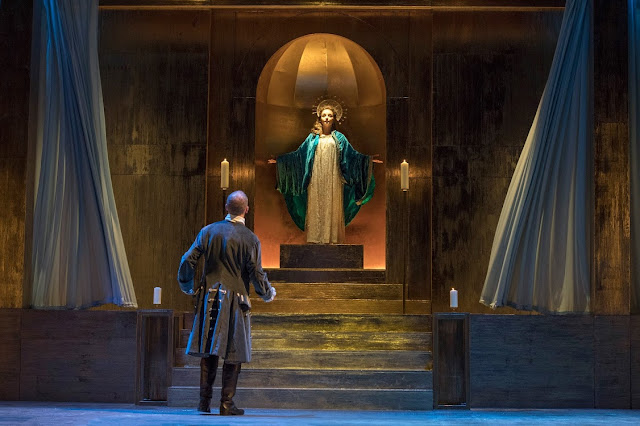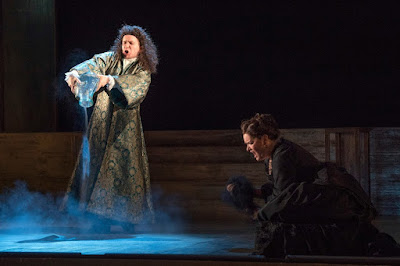 |
| English Touring Opera - Handel: Giulio Cesare - Christopher Ainslie, Soraya Mafi (Photo Richard Hubert Smith) |
Reviewed by Robert Hugill on 4 & 5 Oct 2017 Star rating:
Uncut and in two parts, Handel's opera seria given a strongly characterised new production
 |
| Catherine Carby, Benjamin Williamson (Photo Richard Hubert Smith) |
ETO has assembled a very strong cast for the tour, Christopher Ainslie was Caesar and Soraya Mafi was Cleopatra, with Catherine Carby as Cornelia, Kitty Whately as Sesto, Benjamin Williamson as Tolomeo, Frederick Long as Curio, Thomas Scott-Cowell as Nireno and Benjamin Bevan as Achilla. Designs were by Cordelia Chisholm with lighting by Mark Howland. Jonathan Peter Kenny conducted the Old Street Band.
James Conway's production was placed in a Cordelia Chisholm's gilt box setting, with variable rear walls which enabled a variety of stage effects. The costumes and raison d'etre behind the production were inspired by the period of the work's composition. James Conway, in an excellent article in the programme booklet, introduced the work and the thinking behind the staging. So no Egypt, instead Cleopatra and Tolomeo and their sense of foreign otherness were inspired by the fickle and fascinating (and Roman Catholic) French court with Guilio Cesare, Curio, Cornelia and Sesto the more sober (and Protestant) English. The production did not take the parallels too far, but it provided a helpful basis, and the most daring move was to have Cleopatra's 'V'adoro pupille' as a vision of the BVM rather than a Greco-Roman goddess.
 |
| Soraya Mafi, Benjamin Williamson - (Photo Richard Hubert Smith) |
Soraya Mafi's Cleopatra was rather more strong minded and determined than some. Given the arias sometimes cut, Mafi had leisure to help us explore Cleopatra's fascinating personality, sex kitten (pace Winton Dean) yes, but calculatingly so and full of delightful artifice yet also a politician using her sex to best advantage. And a dominatrix too, she tied Tolomeo up in their scene together and the sexual tension between Mafi and Williamson (the closest thing to comedy in Part One) hinted at darker things (the historical Ptolomaic dynasty was notorious for its incest).
 |
| Catherine Carby, Thomas Scott-Cowell, Kitty Whately (Photo Richard Hubert Smith) |
Christopher Ainslie made a poised Giulio Cesare, very much in control, the ideal enlightenment ruler. the opening scenes had more graciousness than despotism, and his reaction to Pompey (both alive and dead) had commonality with the Enlightenment virtues preached in Mozart's Die Entfuhrung. But Giulio Cesare also falls in love, which disturbs the pattern. Both he and Cleopatra are canny political operators discumknockerated by unexpectedly falling in love. The role seems to suit Ainslie's voice, something not true of all counter-tenors as the original Giulio Cesare, the alto castrato Senesino, had a relatively restricted range. Ainslie's account of the great arias, such as 'Va tacito' gave us much to enjoy, though occasionally you would have liked the snap of a bit more personality to snap the character out of balance a little.
 |
| Christopher Ainslie - (Photo Richard Hubert Smith) |
Mafi and Ainslie really brought out the naval gazing intensity of their final duet, as only Curio and Nireno looked on in admirationa and satisfaction. For the final Coro we stepped out of the drama to point the moral as Achilla and Tolomeo returned from the dead to complete the harmony.
I had thought the ornament in the arias a trifle too elaborate, till I read conductor Jonathan Peter Kenny's article in the programme book about consulting period treatises as well as Handel's own surviving ornaments (for arias from Ottone). All are surprisingly more elaborate than we would expect, though no major changes to the envelope of the vocal line and no major recomposition of the material, simply lots of extra notes. And at the opening of Act Three, Ainslie gave us a lovely messa di voce (swelling and then reducing volume on a single note), a technique for which Senesino (the original Giulio Cesare) was particularly known.
Catherine Carby's Cornelia was more complex and simply not as nice or as sympathetic as some performances. Yes, she was grieving and very much on her dignity, but she was absorbed in her grief, focussed on this to the detriment of her relationship with Kitty Whately's Sesto. Carby sang with a nice sense of focussed intensity, and lovely warm line, eliciting much sympathy. Kitty Whately's Sesto was clearly young, Whately brilliantly suggested his being ill at ease and unready for the demands which his father's death and Cornelia's expectations placed on him. This was less a revolutionary than a young man desperate to show off. Whately showed this with the bright, flexible and impulsive tone which she brought to the arias. Sesto and Cornelia's duet which concludes Act One was perhaps bleaker than some, more true to the emotions.
 |
| Benjamin Williamson, Catherine Carby - (Photo Richard Hubert Smith) |
It was nice to see Tolomeo (Benjamin Williamson) being treated as effete but heterosexual rather than the camp character sometimes given us. Dressed in full wig and coat, a la Francaise, this Tolomeo was a young many tryng to impress someone far more experienced, so that Giulo Cesare's 'Va tacito' became a masterclass in political operation and manoeuvring. Throughout Williamson brought out Tolomeo's delight in manipulation and torment (his playing with Pompey's ashes in front of Cornelia was a nice touch) and his combination of weakness and viciousness.
The small roles, all present in this version, were each nicely differentiated. Benjamin Bevan's Achilla was a bluf soldier, his arias rough, vivid and characterful. Both Frederick Long as Curio, Thomas Scott-Cowell as Nireno provided strong support
Jonathan Peter Kenny's speeds certainly did not take any prisoners, but the cast coped admirably and gave us some technically brilliant moments. The Old Street Band was in similar fine fettle, with notable instrumental moments such as the independent bassoon part in 'Per pieta' and the horn obbligato in 'Va tacito'.
 |
| English Touring Opera - Handel Giulio Cesare - Christopher Ainslie, Soraya Mafi - (Photo Richard Hubert Smith) |
Elsewhere on this blog:
- Daring and original: Radical re-working of Purcell's King Arthur from Daisy Evans and the Academy of Ancient Music - opera review
- Middle of the road but far from boring: Mozart's Requiem from Winchester Collge - CD review
- Terrific performance: Damian Thantrey in Thomas Hyde's That Man Stephen Ward - CD review
- Double helping: chamber music by Michael Haydn, RVW, Alec Roth, Haydn, Thomas Ades, and Schubert in a pair of concerts from the Hatfield House Chamber Music Festival - concert review
- We all say yé-yé: The Chanteuse talks about recreating the songs of Nobel Prize-winning author Patrick Modiano - interview
- Strong singing & stage spectacle: Verdi's Aida at English National Opera - Opera review
- Britten & Silvestrov: Jan Vogler, London Philharmonic & Vladimir Jurowski - concert review
- Architecture into music: Tamsin Waley-Cohen in Freya Waley-Cohen's Permutations - CD review
- Daring: Fieri Consort in Monteverdi and Ben Rowarth - CD review
- Of electro-acoustic music, trombones and cheese: I chat to composer Jack White about his new piece for trombonist Peter Moore - interview
- Failture to ignite: Rossini early comedy at Teatro la Fenice in Venice - opera review
- The Grange Internaitonal Singing Competition - concert review
- Home











No comments:
Post a Comment